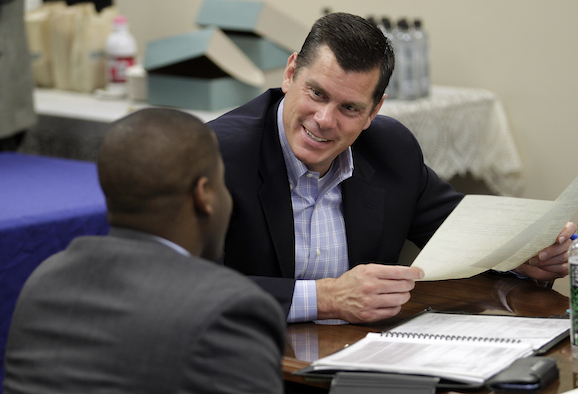If we’re going to cross the chasm and seize the opportunity before us to grow the industry, we need to make outsourcing a career people are attracted to
– Mike Salvino, Accenture, March 2014
And finally it’s time for the long-awaited second tranche or our interview with outsourcing hall-of-famer, and the man who’s steered Accenture’s BPO juggernaut these past few years, Mike Salvino. During Part 1, we talked about the challenges and opportunities facing enterprises striving to move up the “BPO Generations” continuum and Mike’s philosophy about how BPO can provide a genuine career opportunities for such a broad diversity of people. We finish our discussion talking about how companies can drive change and what Mike would do if he is ordained as the Lord of BPO for one week…
Phil Fersht (CEO, HfS): Mike, you’ve talked a lot about what needs to change within companies, to move towards more value and away from these transactional engagements. But what do you think really can drive change within enterprises? What do you think has got to happen within themselves to alter the mindset and their approach to developing their governance teams and their staff?
Mike Salvino: I think we will get people to change based on delivering business outcomes. Remember, business outcomes mean that you’re helping clients increase revenue or further decrease their cost –beyond the normal cost savings of outsourcing.
And when we do that, people step up and take notice. They want to understand how you did it. The first step in delivering business outcomes is doing global operations and achieving silent run. That eliminates any discussion amongst ourselves about “Are the transactions getting done?” Then because of that silent running, we we’re able to apply analytics and study what’s going on. Sometimes descriptive looking at past history to try to predict the future, sometimes running algorithms that will help us predict the future, but you can only get to the analytics stage if the operations are silent.
Once you can get to the analytics and produce some data you can hand it over to people that have industry knowledge to get to those insights and generate business outcomes. The last step is getting it into the right hands of people to make a difference. When we’ve done this for our clients, we’ve delivered on fourth and fifth generation BPO. The next step is to turn around and say, “That’s how we want to get paid in the future.”
We want to get away from the FTE based deals, we want to get away from the deals where they can’t scale up and scale down. Clients should pay for what we deliver—and that’s where this industry can go. Now, when you show clients that we can do that it always comes back to people. Once clients see you start producing business outcomes, they never want the people to leave because they value what they can do. That reinforces the need to develop and grow talent in the industry.
It’s been my experience that if we train our folks, if we produce an environment with our clients where people can learn, if we’re clear about their career paths and care about them personally, and if we are authentic leaders, we’ll achieve the business outcomes. But it’s like anything else, once you have been successful at something, it just catapults and snowballs from there. There’s nothing like winning to create positive momentum.
Phil: So that brings me to my final question: You’re ordained by a higher spiritual power as the Lord of BPO for one week, this is even greater than being in the Hall of Fame for the IAOP, right 🙂 You can do two things to change this industry in your one week reign. What would those be?
Mike: Actually, let me have three! The first thing I would do is erase everybody’s memory banks because there’s still too many people that want to remember the failures of the industry versus the successes. In any business it always takes longer than you thought it would to get to where you wanted to be, but we need to celebrate how far we’ve come. So I would first erase the failures of the past because I don’t think that’s the reality of where we are today and that would give me the platform to do the next two things.
The next thing is delivering and getting paid around business outcomes. Deals would be crafted based on business outcomes and people would absolutely understand exactly what that meant. We would contract to it and the impact we were making on the business would be clear.
Then third is an industry that, for instance, my three kids would want to go into. If I had my wish the industry would achieve the business outcomes that would create the growth in the industry for many years to come and that it would be such a good industry with great career paths that our kids would want to run to it to spend the next 20 years. That would be pretty neat if we could get there and maybe we can if we get enough people telling the story.
Phil: I would agree, Mike. I think we need more good people who can share their vision and whip up enthusiasm and excitement – and I think you are being one of those guys who has helped to do that and have been a real credit to this industry. So I thank you for your time today and sharing some of your views and thoughts with our readers.
Mike: Thanks, Phil. It’s been my pleasure.
Posted in : Business Process Outsourcing (BPO), HfSResearch.com Homepage, HR Strategy, Outsourcing Heros, sourcing-change, Talent in Sourcing







